Witness Moses's transformation from shepherd to leader in a divine journey that challenges both his faith and resolve, beckoning deeper exploration.
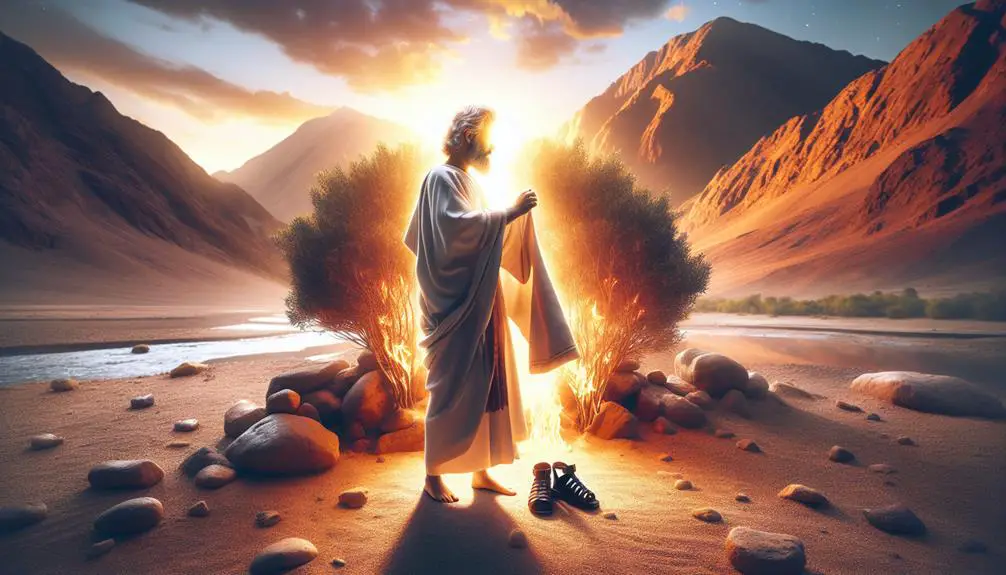
The Call of Moses in the Bible
Mighty moments mark Moses's monumental call in the Bible, a story steeped in divine intervention and human hesitation. You'll find his journey, from tending flocks to confronting Pharaoh, not just a tale of liberation but a testament to personal transformation.
The burning bush encounter, where Moses hears God's voice, sets the stage for a saga filled with signs of divine power and Moses's own doubts. But why does this story resonate across millennia, and how does it reflect on leadership, faith, and the human condition? The answers lie just beyond the surface, inviting you to explore deeper.
Key Takeaways
- Moses's call involved a divine encounter at the Burning Bush, symbolizing God's presence and mission for him.
- Despite initial hesitation, Moses received divine reassurance, empowering him to lead and confront Pharaoh.
- The transformation of Moses's staff into a serpent affirmed his divine mandate and demonstrated God's power.
- Moses's leadership in the Exodus showcased themes of faith, courage, and divine intervention in liberating the Israelites.
The Early Life of Moses

Moses's early life, marked by a dramatic rescue from certain death, sets the stage for his pivotal role in Hebrew history and religious tradition. Born into a Hebrew family during a time when the Pharaoh had decreed the death of all newborn Hebrew boys, Moses's survival is nothing short of miraculous. His mother, in a desperate attempt to save him, placed him in a basket and set him afloat on the Nile. This Nile discovery by the daughter of Pharaoh, who chose to adopt him, is a crucial turning point in Moses's life.
Growing up in Pharaoh's court afforded Moses a unique position. He received an education and upbringing that would have been impossible among his Hebrew kin. Yet, this immersion in the Egyptian elite didn't strip him of his Hebrew identity. It's in Pharaoh's court that Moses's dual identity becomes a central theme of his life. This identity plays a significant role in shaping his future actions and decisions.
You'd notice that Moses's early experiences are foundational to understanding his complex character. His miraculous survival, adoption into Egyptian royalty, and upbringing in an environment of power and privilege contrast sharply with his Hebrew heritage. These experiences equipped him with the unique skills, knowledge, and perspective necessary to fulfill his later role as the leader of the Hebrews. Moreover, they highlight the interplay of divine providence and human agency that characterizes much of Moses's life story. This period of his life sets a precedent for the extraordinary events that would follow, defining his legacy in the annals of history.
The Burning Bush Encounter

One of the most transformative moments in Moses's life occurs when he encounters a burning bush that, remarkably, isn't consumed by the flames. This episode, rich in symbolism and theological significance, marks a pivotal point in Moses's journey and the broader narrative of the Israelites. The burning bush, enveloped in sacred flames yet untouched by them, serves as a profound demonstration of the divine presence. Through this encounter, Moses isn't only introduced to the divine voice but also receives his mission to lead the Israelites out of Egypt.
The elements of this encounter that merit closer examination include:
- Sacred Flames: Unlike ordinary fire, these flames don't consume the bush, symbolizing the holy and unapproachable nature of God.
- Divine Voice: Moses hears a voice from within the flames, identifying itself as the God of his ancestors, thus establishing a direct, personal communication with the divine.
- Location: The event occurs at Mount Horeb, designated as holy ground, further emphasizing the sacredness of the encounter.
- Mission: This moment serves as a divine commissioning of Moses, setting in motion the events that will lead to the Exodus.
In analyzing the burning bush encounter, it's essential to recognize its role in illustrating the character of God as both immanent and transcendent. The divine voice from within the flames speaks directly to Moses, offering guidance and assurance, yet the sacred flames underscore the transcendence and holiness of God. This encounter encapsulates the mystery and awe at the heart of the divine-human relationship, a central theme in the narrative of Moses and the liberation of the Israelites.
Moses's Hesitation and Doubts
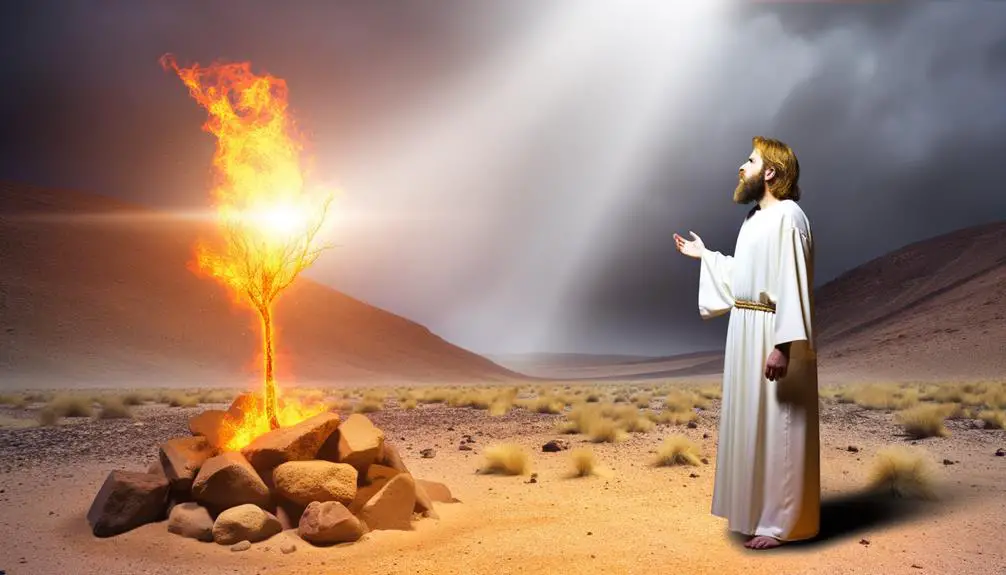
You'll observe that Moses's response to his divine calling is marked by an immediate sense of self-doubt, questioning his own ability and worthiness for the task ahead.
This hesitation is met with divine reassurance, underscoring a pivotal moment of interaction between the human and the divine within the narrative.
Analyzing this exchange provides crucial insights into the complexity of Moses's character and the nature of divine support in biblical texts.
Moses's Self-Doubt
Despite his divine selection, Moses grappled with profound self-doubt when called upon to lead the Israelites out of Egypt. This internal struggle wasn't just about uncertainty; it was deeply rooted in:
- Inner conflict
- Leadership fear
- Perceived inadequacies
- Concern over credibility
Analyzing Moses's self-doubt reveals a complex psychological landscape. His hesitation wasn't merely reluctance; it was indicative of a broader phenomenon experienced by many in positions of potential leadership.
Moses's inner conflict and fear of leadership underscore the universal struggle with self-worth and the daunting nature of responsibility. This introspection into Moses's psyche provides a nuanced understanding of his initial resistance, emphasizing the human aspect of biblical figures and the timeless nature of their experiences.
Divine Reassurance
Facing Moses's hesitation and doubts, divine reassurance played a pivotal role in his journey, highlighting the transformative power of spiritual support in overcoming personal insecurities. This narrative emphasizes God's patience and unending support as foundational elements in Moses's transition from a man plagued by self-doubt to a leader of his people.
God's responses to Moses's objections showcase a remarkable patience, an essential quality that underscores the divine commitment to guiding and supporting individuals through their uncertainties. This divine reassurance isn't merely a response to hesitation but a proactive engagement that empowers Moses, illustrating the depth of God's dedication to his servants.
Through this lens, the story of Moses becomes a testament to the strength derived from divine backing, affirming the critical role of spiritual reassurance in navigating personal doubts.
The Signs of Divine Power
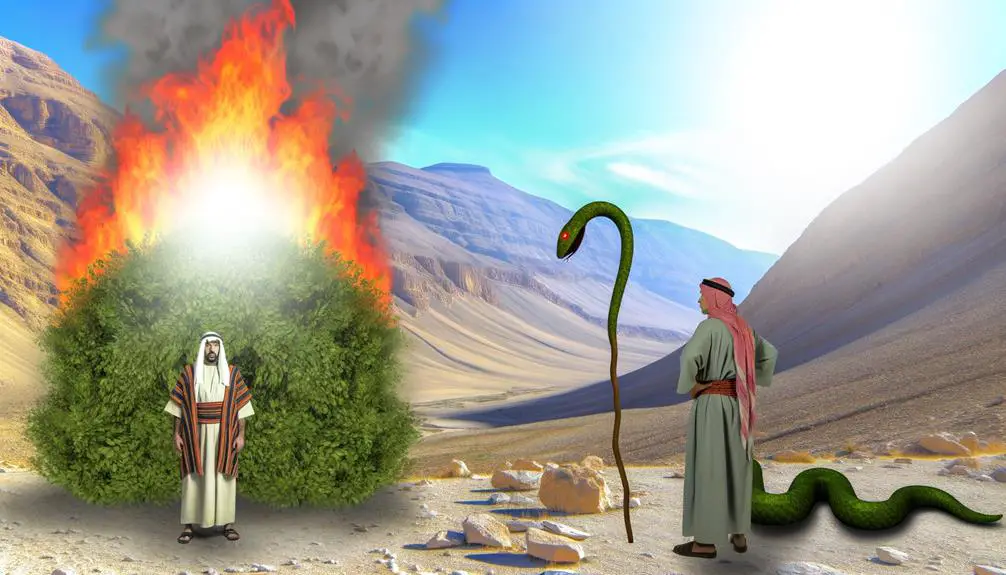
You encounter the signs of divine power as pivotal moments in Moses's calling.
The burning bush encounter exemplifies a direct communication from God, while the miraculous staff transformation serves as a tangible demonstration of divine authority.
These signs not only validate Moses's mission but also underscore the intersection of the divine with the mundane.
Burning Bush Encounter
In the biblical narrative, Moses' encounter with the burning bush marks a pivotal demonstration of divine power, where God commands attention through a flame that burns but doesn't consume. This moment, seeped in divine intervention and desert solitude, highlights critical elements:
- The uniqueness of the phenomenon: A bush aflame yet intact.
- The importance of location: A divine encounter in the desert's solitude.
- The direct communication from God to Moses: A personal call to action.
- The symbolic representation of God's presence: Everlasting and unharmed by earthly elements.
This encounter not only signifies Moses' call to lead the Israelites out of Egypt but also serves as a profound testament to the omnipotence and omniscience of God, capturing the essence of divine power in a singular, unforgettable event.
Miraculous Staff Transformation
Following the burning bush encounter, another profound demonstration of divine power occurs when God transforms Moses' staff into a serpent, further affirming the divine mandate to lead the Israelites out of Egypt. This event isn't merely a display of supernatural force but is deeply entrenched in the symbolic meanings found in ancient myths.
The staff, representing authority and power, undergoes a transformation that signifies the dynamic and sometimes unpredictable nature of divine intervention. Similarly, the serpent has been a symbol of wisdom, renewal, and even danger across various cultures. This miraculous transformation, therefore, serves as a multifaceted sign: it reassures Moses of God's presence and power while embodying complex layers of symbolism that echo ancient understandings of the divine.
The Return to Egypt
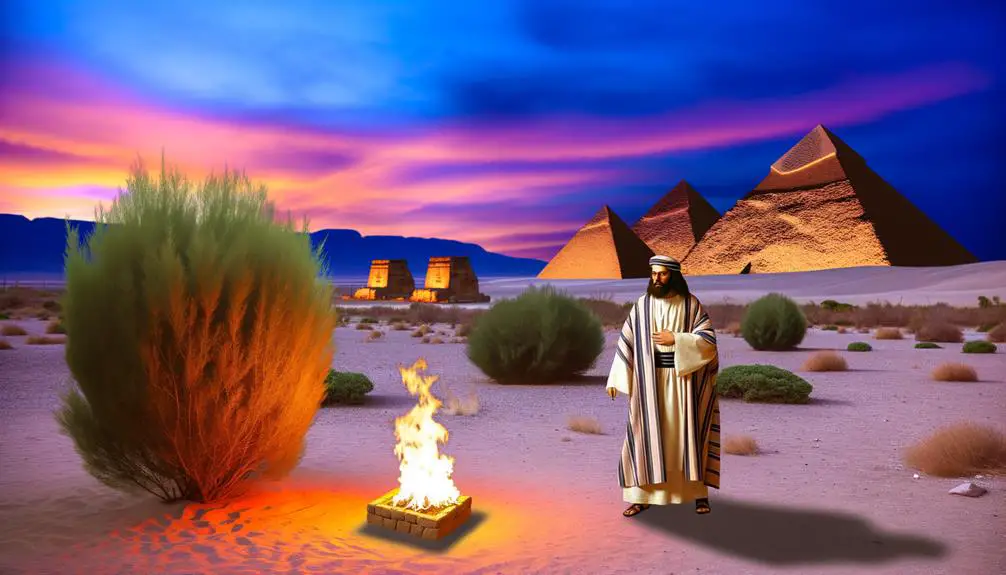
Moses's journey back to Egypt marks a pivotal moment in biblical history, as he answers God's call to lead the Israelites out of bondage. This return isn't merely a physical journey but a profound mission to confront Egypt's plight and challenge Pharaoh's defiance. Moses, armed with divine authority, is tasked with delivering a message of liberation to the Israelite slaves, a people who've long suffered under Egyptian oppression.
Understanding the significance of Moses's return involves examining several key aspects:
- Divine Mandate: Moses acts on direct instructions from God, signifying a divine intervention in human affairs.
- Symbolic Confrontation: The impending confrontation with Pharaoh symbolizes the clash between divine will and human arrogance.
- Hope for the Oppressed: Moses's return brings a glimmer of hope to the Israelites, who've endured years of suffering and despair.
- Preparation for Deliverance: This moment sets the stage for the eventual liberation of the Israelites, highlighting the strategic importance of Moses's mission.
Moses's return to Egypt, thus, is a critical step in the unfolding narrative of the Israelites' liberation. It underscores the complexities of facing an obstinate ruler like Pharaoh, who's unwilling to relinquish his grip on the Israelite slaves. This part of the story, rich in themes of faith, courage, and divine justice, sets the groundwork for the dramatic events that follow. Moses's actions during this phase are crucial, as they not only challenge the status quo but also affirm his role as a leader chosen by God to free his people.
Confrontation With Pharaoh
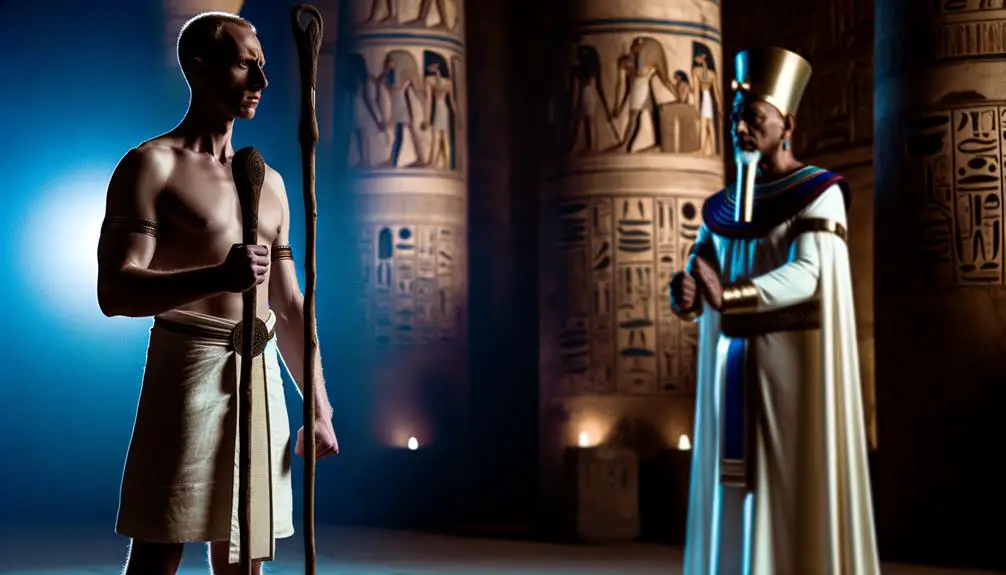
Upon returning to Egypt, Moses faced the monumental task of confronting Pharaoh, a pivotal event that would test both his resolve and leadership in the quest for the Israelites' freedom. This confrontation isn't merely a series of encounters but a complex negotiation marked by the legendary plague sequence, a direct challenge to the Egyptian economy and its pantheon.
The plague sequence, as detailed in the biblical narrative, serves multiple functions. It's not just a demonstration of divine power but also a strategic dismantling of the Egyptian economy. Each plague targets a core component of Egypt's agricultural and societal stability, beginning with the Nile's waters turning to blood, crippling a vital water source and disrupting the lifeblood of the Egyptian economy. Subsequent plagues, such as the infestation of locusts, decimate crops, further eroding the economic stability of Pharaoh's realm.
This economic destabilization is critical in understanding the confrontation's dynamics. It places immense pressure on Pharaoh, showcasing Moses' strategic acumen in leveraging not just supernatural support but also an intimate understanding of Egyptian society's vulnerabilities. The plagues, therefore, aren't random acts of retribution but calculated strikes designed to weaken Pharaoh's resolve by striking at the heart of his kingdom's prosperity.
Analyzing this confrontation reveals Moses' role not just as a spiritual leader but also as a tactician, using a profound understanding of the Egyptian economy to challenge Pharaoh's tyranny. This approach underscores the multidimensional aspects of the struggle for the Israelites' freedom, blending faith with a keen grasp of socio-economic realities.
The Exodus Begins

After successfully undermining Pharaoh's resolve through a strategic series of plagues, the stage was set for the beginning of the Exodus, a pivotal movement in the liberation of the Israelites. You're witnessing a moment where a group of people, bound by their shared lineage and suffering, embark on a journey of monumental importance, not just for their physical liberation, but for their identity as a people chosen by God.
This transition from slavery to freedom wasn't sudden or unannounced. Instead, it followed a deliberate pattern of plague warnings that served dual purposes: demonstrating God's power and giving Pharaoh ample opportunities to release the Israelites. Despite these warnings, Pharaoh's heart remained hardened, leading to the final devastating plague that ultimately broke his resistance.
As you delve into the narrative, it's crucial to highlight several key points:
- The strategic use of plagues as a method to challenge Pharaoh's authority and demonstrate divine power.
- The importance of Moses as a leader chosen by God to guide the Israelites out of Egypt.
- The pivotal moment at the Red Sea, symbolizing not just a miraculous escape from Egyptian pursuit but also a baptism into a new covenant with God.
- The transformation of the Israelite identity, from a group of enslaved people to a nation under a divine mandate.
The crossing of the Red Sea marks a definitive moment in the Exodus story, underscoring the transition from oppression to freedom. This event isn't just a historical or religious milestone; it's a testament to resilience, faith, and the enduring human spirit in the face of seemingly insurmountable obstacles.
Frequently Asked Questions
How Did Moses's Early Experiences in Pharaoh's Court Influence His Leadership Style and Decisions Later in Life?
Your early experiences in a royal court deeply shaped your leadership traits. Navigating court politics honed your strategic thinking and diplomatic skills. These skills later influenced your decisions and leadership style.
You learned the importance of patience, listening, and when to assert authority. This background equipped you to lead effectively, balancing assertiveness with empathy, crucial for guiding and inspiring others.
Your early court life was foundational in developing your resilient and adaptable leadership approach.
What Are the Cultural and Historical Contexts Behind Moses's Name, and How Does It Reflect His Identity and Mission?
You're diving into the roots of Moses's name, exploring Egyptian etymology and naming traditions. This journey reveals much about his identity and mission.
His name, possibly derived from the Egyptian word for 'born of' or 'child,' hints at his initial connection to Egyptian royalty. Yet, it also foretells his role in leading a transformative movement.
This blend of cultural and historical contexts enriches your understanding of his complex identity.
How Have Different Religious Traditions Interpreted Moses's Encounter With the Burning Bush, and What Are the Theological Implications of These Interpretations?
You're exploring the diverse interpretations of a divine manifestation—Moses's encounter with the burning bush. Various religious traditions see this event through different lenses, each unpacking its spiritual significance and theological implications.
This analysis delves into how this moment isn't just a pivotal narrative but a reflection of God's interaction with humanity.
In What Ways Has Modern Archaeology and Scholarship Challenged or Supported the Traditional Narrative of Moses and the Exodus?
Modern archaeology and scholarship have both challenged and supported the traditional narrative of Moses and the Exodus. Dating methods and analysis of geographic discrepancies have played key roles.
You'll find that some findings contradict the biblical timeline, suggesting a different historical context. Yet, other evidence aligns with the scriptural account, reinforcing its plausibility.
This ongoing dialogue between archaeology and theology enriches your understanding, inviting a nuanced view of ancient texts and their historical foundations.
How Has the Story of Moses Been Adapted and Represented in Contemporary Media and Arts, and What Impact Does This Have on Public Perception of His Character and Mission?
Just like superheroes get revamped for the big screen, Moses has undergone a transformation in movies and artistic representations. This retelling shapes how you perceive his character and mission, subtly influencing public views.
Modern interpretations often blend historical elements with creative licenses, sparking debate about accuracy versus artistry. Whether through epic films or abstract art, these adaptations play a crucial role in keeping Moses' legacy alive, yet constantly under scrutiny for their authenticity.
Conclusion
In conclusion, Moses's journey from a humble shepherd to the liberator of the Israelites is nothing short of miraculous. Your encounter with the Divine at the burning bush transformed you, despite your initial hesitations and doubts.
The signs of God's power you wielded were undeniable. Your return to Egypt marked the beginning of an epic confrontation with Pharaoh, ultimately leading to an exodus that forever altered the course of history.
Truly, Moses's story is a testament to the boundless potential within each of us when guided by faith.



Sign up